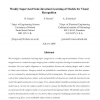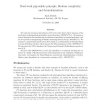198 search results - page 13 / 40 » Weak Probabilistic Anonymity |
WETICE
2006
IEEE
14 years 3 months ago
2006
IEEE
Although the strongest social relationships feature most prominently in our lives, we also maintain a multitude of much weaker connections: the distant colleagues that we share a ...
IJCV
2007
13 years 9 months ago
2007
We investigate a method for learning object categories in a weakly supervised manner. Given a set of images known to contain the target category from a similar viewpoint, learning...
APAL
2004
13 years 9 months ago
2004
We study the extension (introduced as BT in [5]) of the theory S1 2 by instances of the dual (onto) weak pigeonhole principle for p-time functions, dWPHP(PV )x x2 . We propose a n...
CVPR
2010
IEEE
14 years 2 months ago
2010
IEEE
Long-term persistent tracking in ever-changing environments is a challenging task, which often requires addressing difficult object appearance update problems. To solve them, most...
LREC
2010
13 years 10 months ago
2010
Previous work has shown that large scale subcategorisation lexicons could be extracted from parsed corpora with reasonably high precision. In this paper, we apply a standard extra...


